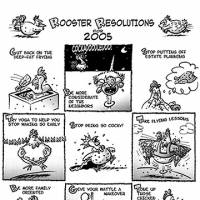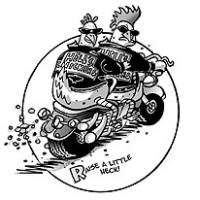A year is a novel that writes itself. The plot may be incoherent and the main characters disappointing, but the overall effect never fails to be riveting.
Take this Year of the Monkey for instance. Has there ever been a year like it -- ever? Serial videotaped Internet-broadcast beheadings? It all started with American businessman Nicholas Berg in May; by the time Japanese backpacker Shosei Koda's turn came around in October we hardly even found it shocking anymore, so much had the year's expansion of reality blunted our capacity for disbelief.
Never mind weapons of mass destruction, U.S. President George W. Bush said in February, when that pretext for invading Iraq had worn so thin even he could no longer defend it. "It's a war of necessity" all the same, a stance echoed by Japan; Saddam Hussein had to go, he was "a madman." Maybe he was, and now he's gone, leaving us with . . . what? Sanity?
In the eyes of much of the world, the United States deposed Hussein only to replace him as a symbol of unrestrained evil. "We've never seen ratings as low as this for America," said Pew Research Center pollster Andrew Kohut of global sentiment towards the only global superpower. That was in March, six weeks before events at a Baghdad prison called Abu Ghraib -- the enduring images are of naked, hooded prisoners being tormented by men, women and dogs -- no doubt sent ratings to new depths.
Japan's year dawned with Prime Minister Junichiro Koizumi's New Year's Day visit to Yasukuni Shrine, his fourth annual visit since taking office in 2001. Brushing off Chinese and Korean outrage, he said, "I prayed for peace and prosperity." He got neither.
Prosperity, in the early days of 2004, seemed the safer bet. Economists were optimistic. China's economy was expanding as perhaps no economy had ever expanded before; American consumers never sleep; and even as late as June, the Bank of Japan's quarterly tankan survey of business sentiment was radiant, logging its best reading in 13 years.
Six months later the bloom was off the rose. High oil prices, a rising yen and a slowdown in China had taken their toll. Japan's third-quarter growth was a sad 0.1 percent, and December's tankan sentiment sagged for the first time in 21 months.
The Year of the Monkey was an election year. The entire world, it seemed, was going to the polls. In some places, Afghanistan for instance, voters did so in bold defiance of terrorist threats, a reminder both of what democracy can cost and what it can mean to those who don't yet take it for granted. Bizarrely enough, two elections, Taiwan's in March and Ukraine's in November, were marked by apparent assassination attempts. The one in Ukraine may -- we'll soon know -- have launched a genuine democratic revolution.
Japan's House of Councilors election in July was not revolutionary, but it was not insignificant either. The Liberal Democratic Party's effective stranglehold on the governing prerogative was not broken, but for the first time in an Upper House vote since 1989 an opposition party, the Democratic Party of Japan, won more seats than the LDP. Might Japan be at least inching -- it is certainly not marching -- away from the era of LDP dominance?
The election that mattered most in global terms was, of course, the American one. What will we remember about it in years to come? "Flip-flop?" "Stay the course?" Gay marriage? "Fahrenheit 9/11?" John Kerry's chin? George W. Bush's dental records?
"Change is coming to America," gloated Kerry after securing his party's nomination in March. The triumphant tone was premature, but he was right -- Bush spent the rest of the year changing America in his image, and Kerry was powerless to stop him. How did Bush pull it off? Considering all he had going against him -- a war turned sour whose motives, increasingly exposed as erroneous if not fraudulent, mocked the soaring military and civilian death toll; the sweeping disregard for America's most fundamental civil liberties in the name of a fumbled "war on terror;" a foundering economy he is credibly charged with mismanaging -- Bush's solid, convincing win has to rank as one of the most impressive feats of electoral politics ever. It will give future historians much to ponder. No doubt they'll understand us better than we understand ourselves.
People were not the only ones to be killed in 2004, and it was not only bombs that did it. Japan, for instance, went through an epic slaughter of chickens early in the year, following its worst outbreak of bird flu since 1925. It was the first of a series of disasters, natural and otherwise, that won for wazawai (disaster) the honor of being named Japan's kanji character of the year.
Disasters, like so much else today, resist confinement within increasingly irrelevant national borders. Twenty-five million chickens had been culled throughout Asia by February. Now the whole world perches on the brink of a possible bird flu pandemic, with World Health Organization officials projecting a death toll in the tens of millions. In such a state of things do we prepare to usher in the Year of the Bird.
"I don't think that people should be going to Iraq on pleasure trips," declared then-Chief Cabinet Secretary Yasuo Fukuda in March. His words were to resonate poignantly seven months later when Shosei Koda, who appears to have done just that, met his terrible end. In March the issue was two Japanese travelers detained by Iraqi police while wandering in southern Iraq. They were soon released and no more was heard of them. The anti-climax, if such it was, was illusory. Japan was soon to find itself with a full-blown hostage crisis.
The Nikkei stock index plunged 195.08 points on the April day when three Japanese -- an aid worker, a freelance journalist and a recent high school graduate -- were seized by Iraqi guerrillas threatening to kill them unless Japan withdrew its Self-Defense Force contingent. Somehow their release was effected a week later without a troop withdrawal, and the hostages returned to face the mysterious but vehement hostility of their compatriots. Leading the ill-natured chorus was Prime Minister Koizumi. "I'd like them to have a sense of responsibility," he scolded -- a profoundly ironic reproach, in view of the pension fund scandal that within days was to put his and the entire government's sense of responsibility in serious question. Had anyone in authority bothered to make their mandatory payments into the endangered fund? "I misunderstood the system," said Finance Minister Sadakazu Tanigaki. He's still at his post, overseeing an 82 trillion yen budget. Let's hope he understands that better.
Was there any happy news in 2004? Japan's 37 medals in a bombless, terror-free Athens Olympiad were nice, as is Princess Nori's soon-to-be-announced engagement, and if that seems too trivial a milestone to register here, consider what a 68-year-old housewife who survived Niigata's devastating October earthquakes had to say: "Everyone has been depressed by the earthquake, but this news is very healing." When sufferers are healed, onlookers should not carp.
Speaking of suffering healed: "This island is as beautiful as [my wife] described," said Charles Jenkins as he touched down on Sado Island earlier this month with his wife, former fellow-hostage Hitomi Soga, and their two North Korean-born daughters. Sado, the presumed final destination of their epic voyage, used to be a penal colony, but never mind. One can well imagine it is beautiful in his and his family's eyes, and Japan, as generous to them as it was churlish to the Iraq captives, plainly wishes them all the happiness they have missed for so long.
Let the Jenkins-Sogas serve as our yearend symbol of hope and renewal in troubled times. Happy New Year, and don't answer your telephone lightly. Callers are not necessarily who they say they are.





















With your current subscription plan you can comment on stories. However, before writing your first comment, please create a display name in the Profile section of your subscriber account page.